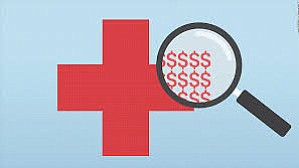Venezuela health system in worse condition than expected, according to survey
CNN/Stylemagazine.com Newswire | 3/28/2018, 7:42 a.m.
By Julia Jones and Stefano Pozzebon, CNN
(CNN) -- A survey of 104 health facilities in Venezuela, commissioned by the opposition-controlled National Assembly, paints a grim picture of a collapsed system hurting for even the most essential goods and services.
According to the report, most laboratory services and hospital nutrition services are intermittent or completely inoperative. Staggering statistics highlight the shortages of items such as basic medicines, catheters, surgical supplies and infant formula.
Venezuela has been in a downward spiral for years, caused by a combination of mismanagement of government funds and the plummeting price of oil. Skyrocketing inflation has created extreme shortages of food, medicine and other essentials, while planned (and unplanned) power outages are common throughout the country and don't discriminate between critical services like clinics and hospitals and the average household.
Water, the survey found, was rarely available at the participating facilities -- 79% of them had no running water at all.
Fourteen percent of intensive care units have been shut down because they're unable to operate -- and the vast majority of open ICUs have intermittent failures due to a lack of supplies, according to the report. Almost a quarter of pediatric ICU's have closed.
Newborns and the elderly hit hard
Since 2016, newborn deaths have been on the rise, but official records are difficult to come by. Venezuelan President Nicolas Maduro fired Health Minister Antonieta Caporale in early 2017, days after her department released its first batch of health- related data in two years. It showed soaring infant and maternal mortality rates. Pregnancy-related deaths rose 66% and 11,466 infants died -- a 30% increase.
The governor of Táchira state, Lady Gómez, told CNN recently that three people died in her region on the same day due to power outages. Two of the deaths happened at Hospital Padre Justo de Rubio, where a battery failed. The other death happened in an emergency room, where staff didn't have enough gas to run the hospital's generators. The deaths included a 4 month-old and a 78 year-old man.
At Caracas Maternity Hospital, doctors told CNN their maternity ward is operating and the infrastructure is working, but there is no medicine to give to patients. Instead, patients are expected to bring any medicine or supplies needed for their treatment themselves. Most end up paying inflated prices on the black market, or depend on émigré relatives to send them supplies.
Healthcare for those who can afford it
Among the health facilities surveyed, private hospitals and clinics suffered the least in terms of shortages, some even reported having close to normal service, but only for those who could afford it.
A day in a private ICU can cost between $130 and $216 at the current exchange rate. Giving birth can cost anywhere between $75 and $200, depending on the clinic. Minimum wage in Venezuela is about $1.50 a month, and residents receive an additional $4 in government-issued food stamps.
Opposition incredulous
The survey was carried out over the first 10 days of March 2018, in conjunction with Doctors for Health, a national organization of physicians and specialists. The survey covered 55 cities and 22 out 23 Venezuelan states.
Opposition National Assembly representative and oncologist José Manuel Olivares presented the findings last week, gawking incredulously at the numbers. "It's not possible that 100% of the hospitals laboratories in the country aren't working and people who need blood transfusions don't have access to them," he said.
Two hours after the publication of the survey, Minister of Health Luis López tweeted a series of photos showing renovated medical facilities and multiple trucks full of what he claimed are medical supplies and medication being shipped to different regions of the country. He said they'd sent 41,834 medical supplies to a hospital in the coastal state of Falcon, as per direct orders of President Maduro.
In one tweet, López boasted about renovations in surgery rooms in a Caracas clinic. The photos published alongside his tweet show pristine halls and operations rooms, but the images are eerily empty of people, and incongruent with CNN's previous reporting in the country, where people flood the waiting rooms and hallways of most hospitals and clinics.
CNN has contacted the Ministry of Health for comment but received no response.
On March 27, Maduro showed his renewed concern over Venezuela's healthcare systems by tweeting, "We will continue to work to guarantee access to healthcare to the Venezuelan people. Health is a sovereign right, and in the Revolution, we will continue to build a healthy country." In his tweet, he quoted another tweet with an ad for Venezuela's National Surgical Plan 2018 -- a program to renovate operating rooms across the country.
Aid desperately needed
In his statement, Olivares singled out the Maduro administration, saying it's "inhumane" that "the executive refuses to accept a humanitarian channel while patients die in medical centers in this country." He was referencing offers from the United Nations, the Vatican, and even the United States, to send aid to Venezuela.
While Maduro and other Venezuelan officials continue to refuse international aid from the US and its neighbors, small, grassroots organizations have been able to receive some very limited amount of aid. The US State Department says it stands ready to send in aid as soon as the Venezuelan government agrees accept it. Leaders from Brazil, Colombia have also made similar pledges.




